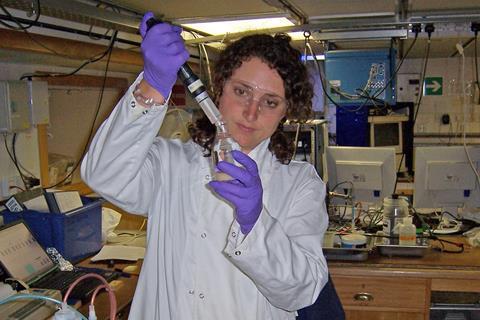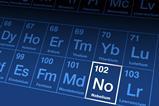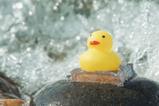Meet Niki Kaiser, whose journey has taken her from the science classroom as a pupil through Plymouth Marine Laboratory and back to the classroom as a chemistry teacher
‘I always wanted to be a teacher. My dad was a teacher, my sister’s a teacher, teaching seemed like a really natural thing to do,’ explains Niki Kaiser. Her dad, however, suggested not jumping in straight away and spending time exploring other careers first.
Niki completed a chemistry degree and then an analytical and atmospheric chemistry PhD, both at the University of Leeds. A postdoc, studying ocean-atmospheric interactions at the Plymouth Marine Laboratory, followed. It was here Niki realised that she was ready to train as a teacher.

She twigged that she was enjoying the outreach with local schools and supporting students more than the actual science. Niki also thrived on the intense teamwork during the long research cruises. ‘I realised that I was really bouncing off working directly with other people,’ she says.
In September 2006, Niki started a secondary chemistry PGCE at the University of East Anglia (UEA). But after a few years of teaching, she found she was missing research. ‘I missed all the reading and having something to investigate further or look at more deeply,’ she says. Tweets by Simon Lancaster, a UEA professor of chemistry education, inspired Niki to start filling that research-sized hole with pedagogy. Niki spent much of her third maternity leave in 2013 reading about research-informed teaching practices. ‘That maternity leave was a turning point for me,’ she says.
In 2015, Niki persuaded the head of her school (Notre Dame High School in Norwich) to allow her to spend a few hours each month helping to embed research-informed practice there. Two years later, she helped oversee the school joining the Research Schools Network. Schools in this nation-wide network, run by the Education Endowment Foundation (EEF), work together to encourage others to use evidence-based teaching approaches. In 2019, Niki won the Royal Society of Chemistry Schools Education Award for her personal efforts towards this goal.
Niki is currently seconded part-time to the EEF as its science content specialist. ‘Content specialists take the recommendations from the research and turn it into usable resources for teachers,’ she explains.
Did you have any particularly inspiring teachers?
Mr Smith, my secondary school science teacher. He was brilliant and had this energy that drew me in. I also really liked the fact he used to ask us questions that stretched us. My first memory of the periodic table is a huge one at the back of his lab.
Who or what inspired you to pursue a career in science?
It was a slow burner, it didn’t happen overnight. A series of sensible decisions led me to an analytical chemistry PhD supported by SmithKline Beecham. A year in, I realised the topic didn’t inspire me and nearly gave up. A very wise person in the chemistry department helped me switch my focus from pharmaceutical to atmospheric chemistry. This allowed me to wet my feet each week at Scarborough, drive a pickup truck and other stuff that I found mega exciting.
What is the single most important piece of advice you would give to any trainee teacher?
Always walk into a new lesson with a clean slate. Both for the pupils and for yourself. Teaching involves a lot of reflection to learn what you could do better or differently next time. But you also have to cut yourself quite a lot of slack.
What is your favourite chemistry topic to teach?
Structure and bonding. I love seeing ideas click into place with pupils and there is so much in this topic where you see them really struggling to get to grips with things and then suddenly something clicks and that’s so rewarding. This topic also really gets to the heart of chemistry and you begin to answer questions like why things look and behave the way they do.
What’s the best thing about teaching?
When you get some feedback from a pupil. A passing comment, a card, a note in their book, something that tells you you have made a difference.
What’s the hardest thing about teaching?
Lessons when you forget not to take things personally. When a pupil is in a particularly bad mood in a lesson or something like that, it’s seldom personal. We have to remember that you can care about someone without taking everything they do deeply personally.
If you could be responsible for making any scientific discovery in the future what would it be?
I would like to find a way to reduce carbon dioxide levels in the atmosphere and halt anthropogenic climate change.
What keeps you awake at night?
I’ve got three kids and I wonder what the world will look like in 10–20 years. I feel like I’ve had a really good run of it: I’ve had lots of opportunities, the world was in a pretty good state and my first global pandemic didn’t come until my 40s. I want them to have similar experiences and opportunities to me.
More resources
Inspire learners and discover more ways chemists are making a difference to our work with our video job profiles.
Add context and inspire your learners with our short career videos showing how chemistry is making a difference.














No comments yet